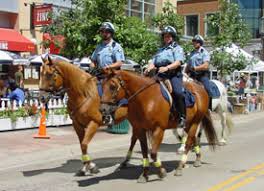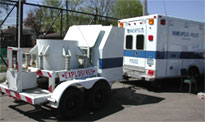 In the state of Minnesota, the cities of Minneapolis, St. Paul, and Duluth maintain mounted patrol units. The Minnesota Sheriff’s Mounted Posse Association (MSMPA) is comprised of volunteer and reserve units of mounted deputy sheriffs across the state who assist the County Sheriff whenever appropriate. Mounted patrol units help with crowd control, crime control, search and rescue, and community outreach. It is estimated that one mounted police officer has the effect of ten officers on foot. Horses provide size, weight, and every officer is 10 feet tall on horseback, enhancing visibility. Mounted police officers can travel quickly to places that squad cars cannot travel.
In the state of Minnesota, the cities of Minneapolis, St. Paul, and Duluth maintain mounted patrol units. The Minnesota Sheriff’s Mounted Posse Association (MSMPA) is comprised of volunteer and reserve units of mounted deputy sheriffs across the state who assist the County Sheriff whenever appropriate. Mounted patrol units help with crowd control, crime control, search and rescue, and community outreach. It is estimated that one mounted police officer has the effect of ten officers on foot. Horses provide size, weight, and every officer is 10 feet tall on horseback, enhancing visibility. Mounted police officers can travel quickly to places that squad cars cannot travel.
Unfortunately, while performing crowd control duties on horseback can increase safety for officers and the public, horseback riding is still a dangerous activity. Although the horses used in mounted patrol units are chosen for their temperament and suitability for the job, horses are still animals who can react unpredictably in unknown situations. Even the sweetest most docile horse can trip, fall to the ground and inadvertently crush a rider.
To ensure safety, officers should follow certain precautions:
- Safety equipment. Wearing a helmet can prevent very serious head injuries. There’s no excuse for not wearing a helmet while riding.
- Wearing a helmet when working with horses while on the ground is also important. Loading and unloading horses into a trailer can be a very dangerous situation. While horses in the mounted patrol unit may be loaded and un-loaded multiple times a week, working with a 1,100-pound animal in a small space is hazardous. Turning out a horse at night back into the herd can also be dangerous. Some horses like other horses better than others and if you turn out into a group of horses standing near the gate and another horse bites the horse you are working with he may kick out and may even hurt you.
- Wearing a helmet while walking out to the pasture to catch a horse is also a smart precautionary measure. Sometimes horses may gather around you and get pushy, hoping the human has a treat or looking for attention. A horse could nip another horse and then someone could kick out or knock you down out in the field. Horses can strike out with their front or back hooves.
- Wear proper footwear around horses. Getting stepped on in boots versus flip flops is an entirely different experience.
- Don’t stand directly behind a horse. Talk to the horse when you are working with him or her to let the horse know where you are standing and to prevent startling the horse.
- Don’t loop a lead line, reins, or lunge lines around your hands. If the horse runs away you could become caught and dragged.
- Properly lead a horse into its stall. When returning a horse to its stall don’t just unclip the lead line from his halter, lead the animal into the stall, walk around the stall, turn him to face the stall door and then back out. This prevents you from getting crushed or kicked in a confined space.
- Tack and groom in the same way each time. This creates a pattern so it is less likely a crucial step is forgotten. Check and re-check girth tightness before you mount. Girths should be tightened slowly and each time the horse should be walked around before moving up an additional hole.
If you sustain an injury, even one which may seem minor at the time, it is important to report the injury to your supervisor. Waiting a few days after what seemed to be a sprain or strain and then reporting the injury may give the workers’ compensation insurance carrier an excuse to deny your claim.
Contact an attorney early in the process. At Meuser Law Office, P.A. we field calls from many police officers and deputy sheriffs injured in the line of duty who may just need a few questions answered. Call us today at 877-746-5680 for a free no-obligation consultation with an experienced Minnesota personal injury, PERA disability, and workers’ compensation attorney.
For more information on mounted patrol units in Minnesota check out the following websites:

